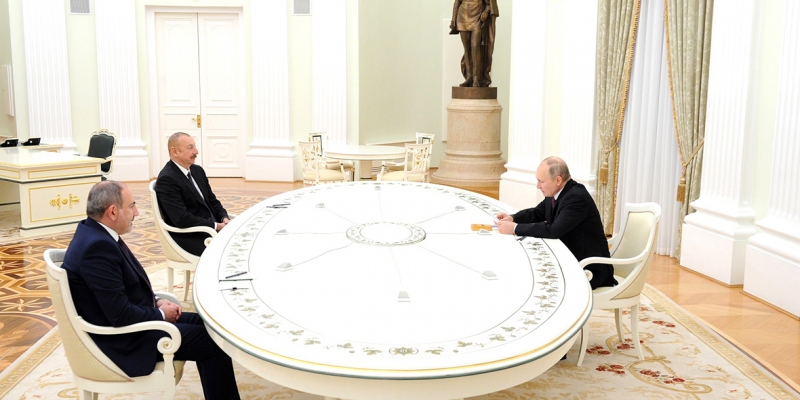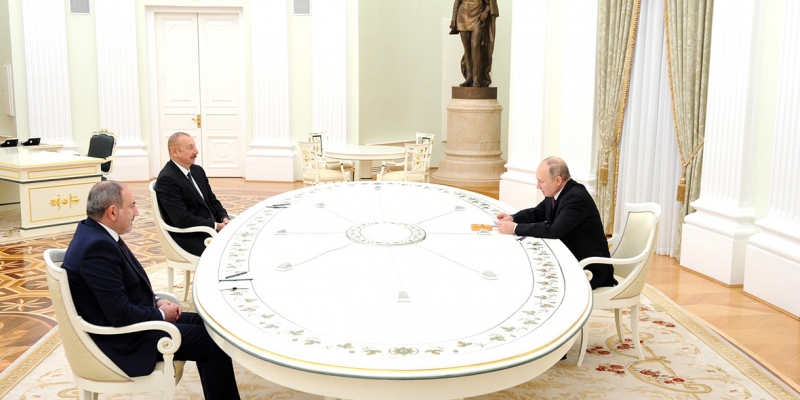The leaders of Russia, Armenia and Azerbaijan will meet in Sochi. The two main and difficult topics on the agenda of the negotiations are the creation of a commission for the delimitation and demarcation of the border and the unfreezing of transport links in the region

Nikol Pashinyan, Ilham Aliyev and Vladimir Putin (from left to right)
Why was the Sochi meeting postponed
On November 26, the Presidents of Russia and Azerbaijan and the Prime Minister of Armenia will meet in Sochi. The last time they saw each other in person was on January 11 in Moscow, when the main outcome of the negotiations was the creation of a deputy prime minister’s group for defrosting transport communications in the region. This time, Vladimir Putin, Ilham Aliyev and Nikol Pashinyan will have to sum up the results of the year that passed after the war in Nagorno-Karabakh.
“It is planned to review the implementation of the agreements of the leaders of the three countries of November 9, 2020 and January 11, 2021, as well as outline further steps to strengthen stability and establish peaceful life in the region,” the Kremlin said in a statement.Special attention will be paid to the restoration and development of trade, economic and transport ties. In addition, separate conversations between Putin and Aliyev and Pashinyan are also envisaged.
Video
The meeting was postponed several times – it was supposed to take place two weeks earlier, the option was discussed to meet on the anniversary of the signing of the trilateral declaration that stopped the war, that is, on November 9–10. But the date did not suit the Armenian side, for which last year’s events are still associated not with peace, but with defeat, a Russian diplomatic source told RBC. The preparation of the meeting was confirmed by video link by the press secretary of the President of Russia Dmitry Peskov.
While there was no clarity on the meeting in Sochi, it became known that Pashinyan and Aliyev will meet on December 15 at the Eastern Partnership summit in Brussels. This was announced by the head of the European Council Charles Michel. “The leaders agreed to meet in Brussels to discuss the situation in the region and ways to overcome tensions for the sake of a prosperous and stable South Caucasus supported by the EU,” the statement said.
This greatly displeased Moscow, which at that time had been seeking a meeting with the mediation of Russia from the parties for more than a month, a Russian diplomatic source says. It looked like the parties to the conflict, and first of all Armenia, despite all the efforts that Russia has made to resolve it, preferredcommunicate with each other not through Moscow, but with the help of the European Union, explains the interlocutor of RBC. It was Yerevan’s unwillingness that prevented the heads of state from meeting in Russia, he notes. President Aliyev said in early October that he was ready to negotiate with Pashinyan “at any time”.
What will the three leaders try to agree on
One of the main topics that the leaders of the countries will discuss is the creation of a commission for the delimitation and demarcation of the border (this has not been done since 1991). At the beginning of the week, Pashinyan confirmed that a potential document on the creation of such a commission would be discussed at the talks.
Since the end of the war, clashes between the sides have taken place more than once. Ten days ago, on November 16, a full-fledged battle with the use of armored vehicles and artillery broke out for several hours on the border of the Syunik region of Armenia and the Kelbajar region of Azerbaijan. Several people from both sides were killed, 13 Armenians were captured. This is the most serious incident between the two countries over the past year.
The place where the shooting took place is one of the most problematic sections of the border. The constant tension is caused by the fact that the Kelbajar region, which was previously controlled by the unrecognized Nagorno-Karabakh Republic (NKR), passed to Azerbaijan after the war, and an interstate border of the two warring countries appeared where the administrative border between Armenia and the NKR used to be. The firsta serious incident occurred on May 12 last year- then in the area of the Black Lake (arm. Sev Lich) the Azerbaijani military entered, but the shooting was avoided. Both on May 12 and November 16, Yerevan verbally appealed to Moscow for military assistance (no written appeal was sent), as it considers this an encroachment on its territory, and Russia is bound by a bilateral treaty under which it must protect an ally.
According to the maps of the Soviet General Staff of the 1970s, which Moscow is guided by, Azerbaijan really violated the Armenian border, two Russian diplomatic sources told RBC. However, Baku insists that it has more recent GPS maps, says one of the interlocutors of RBC. “In fact, we are talking about Google Maps,” he notes. What documents should form the basis of the workThe future commission for the delimitation and demarcation of the border has also yet to be determined. “But the main thing is to launch its work in principle,” says a Russian diplomatic source. The Russian president proposed to focus on the Soviet maps on which the border of the Union republics passed, they are located in the General Staff of the Armed Forces of Russia.
The issue of unfreezing transport communications in the region has not been resolved either. A week ago, the parties continued to discuss the order of opening roads, says a Russian diplomatic source. Two days before the talks in Sochi, on November 24, Azerbaijan and Armenia were visited by Deputy Prime Minister Alexei Overchuk, who heads a delegation to the trilateral working group from the Russian side. In both capitals, he was received by the leaders of the states.
RBC wrote earlier about the proposals on the table of the deputy prime ministers. The most profitable road for Azerbaijan is through the Syunik region of Armenia in the south along the border with Iran – this is the shortest way that can connect the country with the autonomous Nakhichevan. Armenia insists that the restoration of the branch line through Ijevan should begin simultaneously with this road. Both of these roads worked inSoviet times, but over 30 years of conflict in Nagorno-Karabakh were either dismantled or destroyed. In addition, Yerevan is already offering to unblock the Yerevan— Tbilisi— Baku railway. Azerbaijan insists that the road through Meghri should be opened first, and then all other ways.
Subscribe to YouTube RBC Live broadcasts, videos and recordings of broadcasts on our YouTube channel

